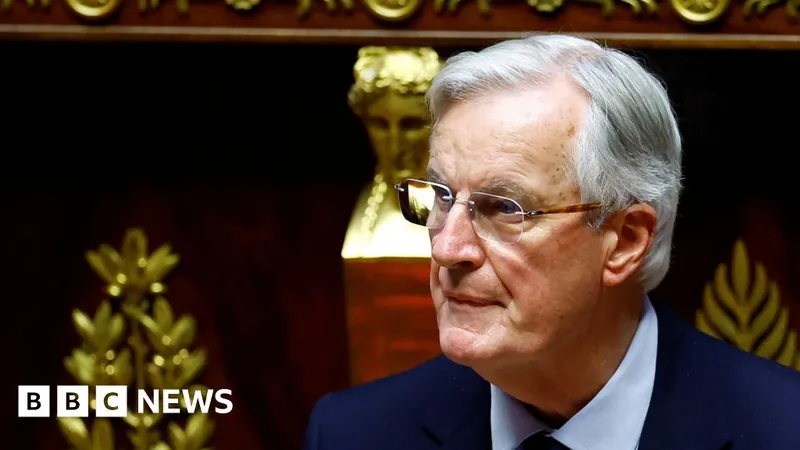
French Government on the Edge: Could PM Michel Barnier's Budget Move Trigger Political Storm?
2024-12-02
Author: Yan
Introduction
In a dramatic turn of events, France’s minority government is hanging by a thread as Prime Minister Michel Barnier faces mounting pressure to defend his controversial budget decision. Utilizing special powers to bypass a parliamentary vote, Barnier has ignited fury among opposition parties, who are set to introduce a no-confidence motion as early as Wednesday.
The Political Landscape
The political landscape in France has been fraught with uncertainty since President Emmanuel Macron called for snap elections this past summer, resulting in a hung parliament where no party holds an outright majority. As a former Brexit negotiator, Barnier’s appointment was intended to stabilize the government, but instead, it has led to increasing instability amid fierce dissent.
Outrage from Opposition Parties
Left-wing parties have voiced their outrage, labeling Barnier’s actions as a catalyst for the "deep political crisis" currently afflicting the nation. The budget bill, aiming to implement €60 billion (approximately £49 billion) in tax increases and spending cuts, has proven divisive. Despite making last-minute modifications to appease critics—including scrapping plans for an electricity tax hike and altering drug reimbursement policies—Barnier’s concessions fell short of securing necessary support.
Justifying the Use of Article 49.3
In a bold move justified by concerns over thwarted economic recovery, Barnier invoked Article 49.3 of the French Constitution, allowing him to advance the budget without parliamentary approval. "I don't think the French people will forgive us for choosing party interests over the future of the country," Barnier declared to MPs, urging all parties to take responsibility amidst the escalating crisis.
Opposition's Response
Opposition groups have wasted no time in retaliating. Marine Le Pen’s far-right National Rally and the left-wing France Unbowed party both indicated their intentions to push for Barnier's ousting. Le Pen voiced her dissatisfaction, stating plainly that "the French have had enough," signaling a mounting demand for change among the electorate.
Potential Consequences of No-Confidence Vote
If the no-confidence vote succeeds, Barnier would serve as a caretaker Prime Minister until Macron formulates a new government—a scenario fraught with uncertainty given the fragmented political climate. It’s possible that the new government could be a technocratic formation or attempt to establish a majority coalition, but analysts deem these prospects grim amid the current political chaos.
Criticism of Barnier's Leadership
Critics within various parties contend that Barnier’s government has only exacerbated political instability—a sentiment echoed by Nathalie Oziol, an MP who said France is enduring "political chaos" as a result of Barnier's leadership alongside Macron’s presidency. Calls for fresh presidential elections have begun to circulate, although Macron's term is not scheduled to end until 2027.
Conclusion
As the tension builds ahead of the parliamentary vote, all eyes will be on whether Barnier’s government can survive this whirlwind of dissent or if France will plunge further into political turmoil. Meanwhile, if the no-confidence motion succeeds, the entire budget bill may crumble, sending shockwaves through the French economy. Will this be the end of Barnier’s tenure, or will he withstand the storm? Stay tuned for the unfolding saga in French politics!



 Brasil (PT)
Brasil (PT)
 Canada (EN)
Canada (EN)
 Chile (ES)
Chile (ES)
 España (ES)
España (ES)
 France (FR)
France (FR)
 Hong Kong (EN)
Hong Kong (EN)
 Italia (IT)
Italia (IT)
 日本 (JA)
日本 (JA)
 Magyarország (HU)
Magyarország (HU)
 Norge (NO)
Norge (NO)
 Polska (PL)
Polska (PL)
 Schweiz (DE)
Schweiz (DE)
 Singapore (EN)
Singapore (EN)
 Sverige (SV)
Sverige (SV)
 Suomi (FI)
Suomi (FI)
 Türkiye (TR)
Türkiye (TR)